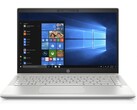Red team fans are a bit disappointed as the Ryzen 4000-series APUs announced this year at CES will not be getting the Navi treatment just yet, but the estimated performance gains over the second gen Ryzen APUs and the Intel competition still seem a bit too optimistic. AMD’s Marketing manager Robert Hallock suggested that each 7 nm Vega compute unit in the new “Renoir” APUs should deliver up to 59% increased performance over the 12 nm Vega CUs in the Ryzen 3000 APUs, however, that does not mean that the overall graphics performance will be 60% higher. Thanks to a series of new benchmarks spotted by renowned leaker TUM_APISAK we now have a clearer idea of how the new Ryzen 4000-series is going to fair against Intel’s counterparts with Iris Plus iGPUs.
According to the 3DMark 11 test dug up by TUM_APISAK, the new Radeon 4000 APUs are indeed faster than the Intel counterparts, but not by a huge margin as presented by AMD in the CES keynote. AMD’s Vega iGPU on the Ryzen 7 4800U scores around 10% higher compared to Intel’s similarly clocked Core i7-1065G7 with the Iris Plus iGPU, while the Ryzen 7 4700U is only 2% faster. Still, the Ryzen 7 4800U is around 30% faster when it comes to physics.
There is also a test pitting the Ryzen 7 4800U against the Core i7-10750H CPU, and the AMD chip appears to be only ~15% slower, despite 45% lower clocks and 30 W lower TDPs. Additionally, it looks like the Ryzen 7 4800U will get configurable TDPs, as one test compared the 15 W variant to a 25 W variant, which managed to score 20% higher in graphics tests and 7% higher in CPU tests.
So how exactly does this translate to that 60% increased performance per Vega CU? Compared to the gen 2 Ryzen 7 3700U, the upcoming Ryzen 7 4800U is around 25% faster in graphics tests, yet the pure CPU tests show performance gains of more than 60%. Also, the latest UserBenchmark tests spotted by TUM_APISAK conclude that the new 7 nm Vega iGPUs are around 34% faster than the Iris Plus iGPUs from Intel. Not bad at all, but the addition of Navi CUs would have really blown Intel’s Iris Plus iGPUs out of the water.
I first stepped into the wondrous IT&C world when I was around seven years old. I was instantly fascinated by computerized graphics, whether they were from games or 3D applications like 3D Max. I'm also an avid reader of science fiction, an astrophysics aficionado, and a crypto geek. I started writing PC-related articles for Softpedia and a few blogs back in 2006. I joined the Notebookcheck team in the summer of 2017 and am currently a senior tech writer mostly covering processor, GPU, and laptop news.
> Expert Reviews and News on Laptops, Smartphones and Tech Innovations > News > News Archive > Newsarchive 2020 01 > New graphics tests reveal AMD's Ryzen 4000 iGPUs are significantly faster than Intel's Ice Lake alternatives
Bogdan Solca, 2020-01-15 (Update: 2020-01-16)























